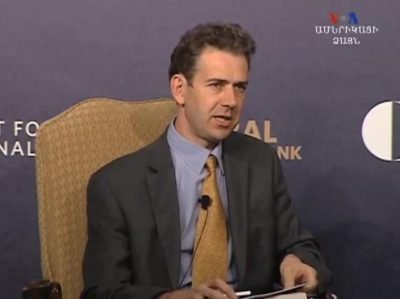The world is not the sum of its nation-states; there are places beyond UN member states that receive few visitors. We talk to an explorer of diplomatically forsaken regions to understand how these places feel.
London (Brussels Morning) The international system is one of recognised nation-states but there are several regimes with de facto control over a territory that have no international recognition, whether called quasi-states, pseudo-states, occupied territories or other — from Kosovo to Transnistria and East Timor to Northern Cyprus.
These places receive few travellers but Thomas De Waal is one of them. An explorer, correspondent and analyst, he has probably spent more time than most in these diplomatically forsaken regions during his time at the BBC World Service and think tank Carnegie Endowment for International Peace. Critically engaged, his missions in diplomatic no-mans-lands have made him friends and enemies in equal measure. De Waal speaks to Brussels Morning abouthis experiences in these states.

Ambassador Tedo Japaridze (TJ). You are one of the foremost experts in places like Ossetia, Abkhazia, Nagorno-Karabakh and to some extend Crimea, Transnistria, and other so-called non-state regimes along the Russian border. Do you feel that from North Cyprus to Abkhazia we can judge these regimes with a single yardstick? Are some more legitimate than others?
Thomas De Waal (TDW). You are right, it so happens that in the last 30 years I’ve made a habit of visiting places that can variously be described as “unrecognised”, “breakaway”, “quasi-states” or “de facto states”. It started for me in 1994, when I first visited “independent” Chechnya under Jokhar Dudayev, I also travelled to Nagorno Karabakh, Abkhazia, South Ossetia, Transdniestria and Northern Cyprus. It’s fascinating to go to these places to see for themselves what distinguishes them from recognised states. Often it’s not much in everyday life, though they have some eccentric features. It also makes you ask yourself useful questions about what it means to be a state and a citizen in today’s world.
Obviously, with the exception of Cyprus, all these places are the product of the messy break-up of the Soviet Union. And I think it’s worth saying this is nothing new. The last time the Russian Empire broke up, in 1917, there were even more of these statelets. There is a wonderful map called “Ephemeral States of the Russian Civil War”, which shows you all sorts of places with exotic names that everyone has forgotten about, like the Gilan Soviet Republic, the North Caucasian Emirate or North Ingria.
All those little statelets had disappeared in a few years. This time we have the phenomenon of semi-permanent breakaway territories, such as Abkhazia and Transdniestria. What’s different this time? One thing is the “patron” phenomenon. You have powerful states — Russia, in the case of most of these post-Soviet territories, Turkey, in the case of northern Cyprus — prepared to protect these little statelets to further their own agendas. Another factor is that one century ago most of those little territories were simply conquered by force and nowadays the world is more disapproving of the use of violence to resolve these disputes. Although you could say that Russia got away with it in Chechnya, and Azerbaijan, to a certain extent, in the latest Karabakh war.
My other key point is that they are all different. To take the Georgian example, Abkhazia and South Ossetia are taking very different paths. South Ossetia probably has a population of less than 40,000 nowadays. Not just Georgians have left, but Ossetians too. There is basically no South Ossetian political project other than an ambition to join North Ossetia and Russia. But the Russians are not interested in that, the main place where they want to keep up the fiction of an independent South Ossetia is Moscow. The Abkhaz on the other hand are much more serious when they say they want to be independent from Georgia, and from Russia too. I don’t think anyone sees that happening, but it does mean that they are more serious about trying to build up elements of statehood and they try to keep up contacts with both Tbilisi and Western countries. In 2020, they accepted international medical aid from WHO and UNDP via Georgia and were open to collaboration with Tbilisi.
In my dealing with these places there are two distinctions I like to make. One is that we should be looking at “conflict transformation” rather than “conflict resolution”— in other words that there is no short-term fix, there will be no going back to where we were in 1991 and starting again. Instead of transforming attitudes over a whole generation and coming up with something new, we are looking at some kind of “paradigm shift”. The second distinction is that although we almost certainly won’t recognise these places as legitimate sovereign entities, we can still respect their aspirations of the people there. As Abkhaz says, “I want to be free of rule of Tbilisi”, and instead of saying “You’re not allowed to say that”, the better response is, “I hear what you are saying. Tell me about it. Is there a way you can visualize a future that works for both you and the Georgians who were expelled from Abkhazia too?”
TJ. There is an old tradition of Soviet and later Russian “what-about-ism” in foreign policy. Do you feel the comparison between Kosovo and Abkhazia is legitimate?
TDW. No and yes. Comparison is always useful, even when the cases are quite different, which they are here. The demographics and the international politics of the Kosovo case were quite different. Obviously, the Kosovars got lucky in getting Western support at a crucial moment. And a deal was done to protect the rights of Serbs in Kosovo and their cultural monuments — on paper at least.
What’s definitely the case is that allowing Kosovo to become internationally recognised set a precedent that other breakaway territories noticed — after Kosovo got recognised, the leaders in Abkhazia or Nagorno Karabakh were never going to say to their populations, “Well they got independence from Serbia but we don’t have a hope”. They doubled down on their rhetoric, so there was a direct “Kosovo effect” in the Caucasus.
And I guess that brings us to the issue of separatism in general. New states do get born in the world, just not very often. In the last few decades, as well as Kosovo, we’ve had the examples of East Timor, Eritrea and South Sudan. As a British person I suppose I should mention that the US Declaration of Independence in 1776 was a separatist act directed at my country. It was an illegal act as far as the UK was concerned. And just a few years ago we allowed Scotland to have a referendum on independence.
A few years ago I quoted what Bill Clinton was reported to have said when he was asked what his overall view on abortion was and he answered, “It should be safe, legal and rare.” I guess that’s what I think about separatism as well. In some rare cases it can be the answer to these sovereignty disputes, we shouldn’t rule it out altogether, but I think the conditions for it to happen to be very strict.
TJ. There is a century-old tension between popular sovereignty and territorial integrity. One of the answers has been “devolution,” particularly in the UK. Given the political friction in the North of Ireland, Scotland, Catalonia and Northern Italy, do you still feel that is the way forward?
TDW. I agree that autonomy and devolution are definitely the best solutions. And we say these models being deployed all over Europe in what used to be zones of conflict, from Northern Ireland to South Tyrol.
The trouble is that where there is no democracy and where there has been no violence, no one really believes in these models. There is a story from the 1990s of a delegation of Armenians and Azerbaijanis being invited by the Finnish government to visit the Aaland Islands, which are part of Finland but are Swedish-speaking and have substantial autonomy, even their own foreign relations. After a couple of days, the Finnish guests turned to the Karabakh Armenians and said a bit hopefully, “Couldn’t this work for you?” And Arkady Gukasian who was a prominent Karabakhi politician supposedly said, “Give me a piece of paper and I will sign it right now”. Then he paused and added, “I agree that Karabakh will become part of Finland!” Peaceful Finland is fine, just not Azerbaijan.
So it’s something to strive for, but for these models to work in places like the Caucasus in the present day, you need much greater levels of trust and much stronger democratic institutions than there are at the moment.
TJ. We went from City-States to Empires and from Empires to Nation-States. There was a sense that Europe’s “ever-closer union” was the way forward in a multilateral world in which scale matters. Is Brexit the beginning of something new or the “odd one out” in a pattern of greater unions?
TDW. I’m a very a strong British “Remainer” in the UK-European context, so my immediate response to your question is quite an emotional one. I want to believe Brexit was a one-off, that the “European project” will still work and that, in some shape or form, we will re-attach ourselves to the European Union.
But let me try and be cooler and more analytical. I would say that there are two big opposing global tendencies at the moment. There is a “civilizational” discourse which is making the nation-state stronger, in which big countries like China, India, Russia and Turkey, and some smaller ones like Hungary are saying “We don’t accept your international standards and criticisms, to tell with your universal human rights, this is how do things here.” Brexit was a little case-study of this first phenomenon. But of course there is also a continuing trend of global inter-dependence. World trade makes everyone inter-connected and the same environmental threats confront us all and need a coordinated response. Surely the second tendency will eventually be stronger than the first, but will it apply only to technical issues, or to values and rights as well?
The European Union model certainly has its problems. This year we’ve seen a risk-averse overly bureaucratic response to the vaccine roll-out, which has allowed Great Britain to get out in front in fighting the pandemic. EU officials speak in a technocratic language that often sounds a bit “Soviet”, a kind of code that seems to be a million miles from the vision that they embarked on in the 1950s. But I still give the EU credit for being the bravest effort there is to share sovereignty, break down borders and come up with international solutions to global problems. So I wish them success in keeping the European project on track—and I wish us some humility and a lot of luck in dealing with the long-term problems of Brexit.




